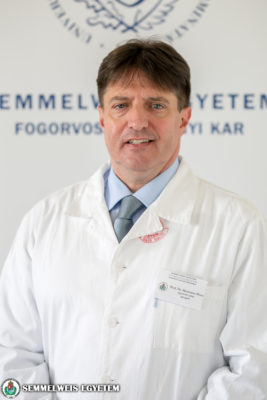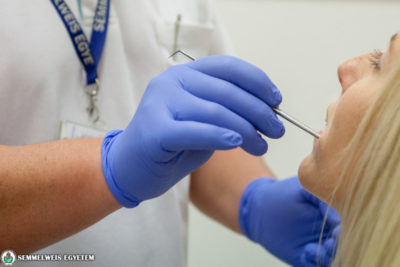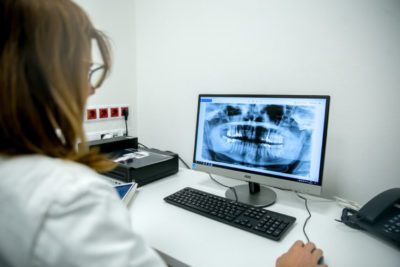The public health program series of Semmelweis University organized on the occasion of the 250th anniversary of the institution ended with the programs offered by the Faculty of Dentistry and the Department of Otorhinolaryngology, Head and Neck Surgery on 27 May. In the last year and a half, tens of thousands of interested people have registered for the program series presenting the most common diseases and their therapeutic opportunities and prevention.
Dental care professionals of the Faculty of Dentistry prepared with nine presentations as well as with related consultation opportunities for the closing event of the program series. The presentation on gingivitis and periodontal disease as well as the presentation on the embryonic development of teeth had the highest number of registered participants.
 The presentation on the embryonic development of teeth guided participants through the process of tooth eruption and tooth development starting from children’s deciduous teeth to permanent teeth. The presentation described the process of what sort of prevention strategies professionals use for deciduous and permanent teeth at what age, or what therapies they apply, if necessary. Many participants were also curious about the contributing factors of jaw popping that causes pain and reduced joint mobility. Participants had the opportunity to gain important knowledge about the anatomical structure of the jaw joint, as well as about its diagnosis and therapeutic options.
The presentation on the embryonic development of teeth guided participants through the process of tooth eruption and tooth development starting from children’s deciduous teeth to permanent teeth. The presentation described the process of what sort of prevention strategies professionals use for deciduous and permanent teeth at what age, or what therapies they apply, if necessary. Many participants were also curious about the contributing factors of jaw popping that causes pain and reduced joint mobility. Participants had the opportunity to gain important knowledge about the anatomical structure of the jaw joint, as well as about its diagnosis and therapeutic options.
 Further presentations revealed that a number of diseases may cause dry mouth, starting from diabetes to certain mental conditions, and that those affected may have difficulty in eating, swallowing, speaking, and even in tasting. Those interested were provided with information about mobile phone applications that have helped to raise health awareness and improve oral hygiene habits even in the current epidemiological situation.
Further presentations revealed that a number of diseases may cause dry mouth, starting from diabetes to certain mental conditions, and that those affected may have difficulty in eating, swallowing, speaking, and even in tasting. Those interested were provided with information about mobile phone applications that have helped to raise health awareness and improve oral hygiene habits even in the current epidemiological situation.
In addition to the development of dentistry and the dental profession, presentations were also held on oral mucosal lesions and the prevention of oral tumors. In connection with the latter, a sad data was revealed: according to the World Health Organization (WHO), Hungary is the first in Europe in terms of the number of oral tumors: twice as many people die of oral cancer as in a car accident per year. Many people were also interested in the presentation on the role of wisdom teeth, which also provided information about the often necessary surgical care.
 In the course of the presentation held by the Department of Otorhinolaryngology, Head and Neck Surgery, the Outpatient Clinic for Olfactory Disorders was presented. Taste and olfactory disorders caused by COVID-19 and other viral infections and their therapeutic options were discussed. Participants had the opportunity to learn about the characteristic symptoms of obstructive sleep apnea (OSA), as well as useful knowledge about the prevention and symptoms of pharyngeal cancer and the role of the HPV virus.
In the course of the presentation held by the Department of Otorhinolaryngology, Head and Neck Surgery, the Outpatient Clinic for Olfactory Disorders was presented. Taste and olfactory disorders caused by COVID-19 and other viral infections and their therapeutic options were discussed. Participants had the opportunity to learn about the characteristic symptoms of obstructive sleep apnea (OSA), as well as useful knowledge about the prevention and symptoms of pharyngeal cancer and the role of the HPV virus.
The certified specialists in nutrition science of the Health Development Center were awaiting those interested with personalized online individual nutrition and lifestyle counseling. During the session, they examined the current health status, eating habits, lifestyle of the participants and helped them with individual goals.
Not only the latest Semmelweis Health Days event held on 27 May was successful, but the entire program series launched in September 2019 to celebrate the university’s 250th anniversary has received a positive feedback: the public welcomed the health preservation program focusing on public health very positively
 – said Dr. Péter Hermann, Vice-Rector for Educational Affairs. The Vice-Rector also pointed out that the event was hosted by a different department each time, whose representatives organized interactive presentations, screenings, demonstrations. Professor Hermann also added that the health days were held in person in the course of the first 6 occasions, yet after the outbreak of the epidemic, the program was transferred to the online space.
– said Dr. Péter Hermann, Vice-Rector for Educational Affairs. The Vice-Rector also pointed out that the event was hosted by a different department each time, whose representatives organized interactive presentations, screenings, demonstrations. Professor Hermann also added that the health days were held in person in the course of the first 6 occasions, yet after the outbreak of the epidemic, the program was transferred to the online space.
In the last one and a half years, the following topics were included in the program: mental health, first aid, topics related to gynecology, diseases of the elderly, musculoskeletal problems, pediatric prevention, lung and heart diseases, theoretical health science, dental and dermatological diseases. Tens of thousands of participants joined the presentations based on pre-registration and had the opportunity to ask their questions from Semmelweis University’s physicians and health care professionals.
Orsolya Dávid
Photo: Attila Kovács – Semmelweis University
Translation: Katalin Illés-Romhányi


